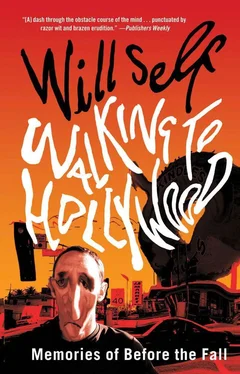Will Self - Walking to Hollywood
Здесь есть возможность читать онлайн «Will Self - Walking to Hollywood» весь текст электронной книги совершенно бесплатно (целиком полную версию без сокращений). В некоторых случаях можно слушать аудио, скачать через торрент в формате fb2 и присутствует краткое содержание. Год выпуска: 2011, Издательство: Grove/Atlantic, Inc., Жанр: Современная проза, на английском языке. Описание произведения, (предисловие) а так же отзывы посетителей доступны на портале библиотеки ЛибКат.
- Название:Walking to Hollywood
- Автор:
- Издательство:Grove/Atlantic, Inc.
- Жанр:
- Год:2011
- ISBN:нет данных
- Рейтинг книги:4 / 5. Голосов: 1
-
Избранное:Добавить в избранное
- Отзывы:
-
Ваша оценка:
- 80
- 1
- 2
- 3
- 4
- 5
Walking to Hollywood: краткое содержание, описание и аннотация
Предлагаем к чтению аннотацию, описание, краткое содержание или предисловие (зависит от того, что написал сам автор книги «Walking to Hollywood»). Если вы не нашли необходимую информацию о книге — напишите в комментариях, мы постараемся отыскать её.
Walking to Hollywood — читать онлайн бесплатно полную книгу (весь текст) целиком
Ниже представлен текст книги, разбитый по страницам. Система сохранения места последней прочитанной страницы, позволяет с удобством читать онлайн бесплатно книгу «Walking to Hollywood», без необходимости каждый раз заново искать на чём Вы остановились. Поставьте закладку, и сможете в любой момент перейти на страницу, на которой закончили чтение.
Интервал:
Закладка:
I sat down by the old harbour, savouring the fishy smell. A few remaining inshore boats were jostled by a clinking mass of sailing dinghies with aluminium masts, which in turn had been pushed to the barnacled seawall by two giant, crudely formed steel feet. Rising, I went down to the quayside so that the feet towered four storeys above me, rust-streaked rivets running around the insteps and up the shins. To seaward the swell of the calves almost blocked the harbour entrance, but I could make out the thickening thighs, the oil rig of the hips and pelvis, and beyond this the tanker-sized chest stranded on the sands.
It was less the anthropoid form of the turbine that bothered me than the fact of it being there at all. Even if the structure was hollow the highest of tides still wouldn’t float it. How had it come to be beached here in Bridlington, rather than implanted with its robotic fellows, the long line of which I could see stitching the horizon with their slow-revolving blades? I wanted to ask someone what the hell was going on. How long had the turbine been run aground here? Was it under repair? I couldn’t understand why there wasn’t a crowd of gawpers — at the very least a fisherman coiling a rope or chipping paint, but there was no one, and when I reached the top of the harbour wall the entire disconcerting length of the turbine was revealed: it was decapitated, bladeless — or armless — and with its slightly bandy legs and deep chest appeared out of kilter. The enormous turbine reminded me of someone, but who? I resolved to find out when I reached Skipsea.
The last Michelin people rolled past me along the low concrete walls bounding some defunct fast-food joints, the beach blew out before me, a quarter- then a half-mile wide. Families were silhouetted behind the bellying canvas of their windbreaks, while lone men flew their outsized kites, each another ellipsis added to the gulls’ wings quoting the sky. The lone men staggered, skidded, the kites sliced down on to the sand. The lone men went to curl up behind them.
Inching towards me at my own dogged pace came some stuff washed up along the tide line. Was it frills of seaweed or more durable wrack, detergent bottles and car tyres? The dogs had dragged their walkers off, the kite flyers had skittered away, the wind was rising, and there were no particulars anymore with which to judge the scale of things, only the universals of sea, sand and sky. I started when the first pillbox popped up at my feet, tilted, its single oblong eye black and weeping. Beyond this sentinel there were more and still more hammered down into the wet sand, limpid pools at their gnarled feet. Were they mourning their failure — not to defend the country, for no invasion had ever been mounted — but the land itself, land that, in the seventy years since they had been built, had been driven back a hundred yards to where it now cowered, its raised hackles a field of barley?
I went up there and laid some apostrophic turds among the crop. There was no one around; besides, I doubted that I could really be leaving any spoor. I sensed already that the walk was doing its own mysterious business, so that with each step I took, far from creating a footprint, I rubbed away whatever marks had been left on my memory, leaving it as smooth as the sable plain ahead.
Local Indians stood by their quad-bike steeds, their squaws danced to a boom box; an arrow of WWII fighters flew overhead. This was all: the hours filed by me, the beach narrowed, its innumerable grains flowing through the glassy pinch-point of my contemplation. The shoreline humped up into a muddy cliff of domestic proportions — maybe only sixty feet high. On my holiday I took with me the madman on his chain, the rubber figurine, these clayey flotches and bulbous little stalagmites, in among them the slow surge of the long-since broken waves. I took entire sections of brick wall, washed round and smooth as cushions, tight ribbons of mortar cutting into them.
The muddy cliff morphed into thousands of dragons’ teeth, then concrete-filled oil cans; a slipway staggered past, atop it a compound of caravans reached by a rusty iron flight. The cliff slid on, and now up above me lanced the spars and beams of structures recently undermined. Drainpipes thrust up from the mud, together with coils of wire, dead-birds’-wings of polythene, three courses of a garden wall complete with curlicues of cast-iron decoration spanned a gulch in the mudface, above this the nibbled end of a road to nowhere. To the west, unseen, the sun was setting into this clag, the sky silvered, then greiged.
Surely by now I must be near to Tipsea? Dipsea? Skipsea? whatever the place was called. Even if I wasn’t, I’d have to head inland, for darkness was coming and the tide had risen to within twenty yards of the cliff, while up above hung the outlines of half-shacks, quarter-bungalows and the oblongs of hard standings recently abandoned by static homes. The one-sided alleyway of dereliction was stark against the evening sky. I had been walking for over seven hours since I stepped down from the train; landward there was nothing I could recall, while to the east, I knew, lay Wilsthorpe and Auburn, Hartburn, Hyde and Withow, their salted fields and silted cottages, their shingle-filled belfries and long-rotted inhabitants, whose grinning skulls were stuffed with seaweed and crabs.
I worked my way up the cleft of a drainage ditch and so came to the cliff top. The bisected alley was still gloomier up close: the abandoned chicken coops, their tarpaper roofs lifting away like scabs; the epidermal layers of linoleum left exposed in the corpse of a bungalow. I thought I heard footsteps in this half a home, a muttered curse, a shoulder roughing up a wall. I felt no inclination to investigate — in the declining light the turbines stood along the horizon like gibbets, or crucifixes. All but one had been anchored for the night, and as I turned inland its blades waved goodbye.
At the Board Inn the liqueur coffees were £3.10 and the girl in the big white blouse said, ‘Ahl av a loook faw ya,’ and went off to see if the lamb balti was on. I sat, staring blankly at the raffia placemats and the bentwood chairs gathered around them. I was the sole customer for the mini savouries combi platter, the only person who could be urged, ‘Treat Yourself to Spanish “Rioja”’. As someone schooled in the Oxford Analytic tradition, I feared that punctuation might well be logic, and so these quotation marks implied a certain dubiety, that the wine was indeed Rioja was only hearsay.
The girl returned with an affirmative and took my order, then a while later she came back again with a little karahi on a plate, a stack of tiny rotis beside it and a small mound of white rice. I decanted the meaty sludge and began eating with the laboured precision that is the very hallmark of solitude. This stuff — the lamp contrived from four bunches of metal grapes, a fish tank in a gilt frame, photographs of the Inn in the 1960s showing Morris Travellers plumping up soft verges — all of it swirled briny before my tired eyes.
And then, a few tables away, there was a quartet of large German engineers in tartan shirts, upsetting stonewashed jeans and high-topped lace-up rubber boots. They were getting physical with pints of lager and a bottle of ‘Rioja’. One second — as I chased rice grain with tine around the stadium of my plate — they weren’t there, the next they were, decompressing from the day’s exertion, their mud-smeared fingers definite, feeling. They hadn’t simply materialized, for there was their Toyota pickup, outside the window, the treads of its outsized tyres knobbly like tripe.
The place name ‘Bridlington’ projected from the erosive wash of their German, and so I went over and, excusing myself, asked if, by any chance, they were working on the wind farm project? Absolutely! They invited me to join them — what was I drinking, would I take some wine? (Although, confidentially, they very much doubted it was Rioja.) I retrieved my tonic water from my own table, leery of too great an intimacy. I might be asked questions about myself that I could only answer by consulting my notebook.
Читать дальшеИнтервал:
Закладка:
Похожие книги на «Walking to Hollywood»
Представляем Вашему вниманию похожие книги на «Walking to Hollywood» списком для выбора. Мы отобрали схожую по названию и смыслу литературу в надежде предоставить читателям больше вариантов отыскать новые, интересные, ещё непрочитанные произведения.
Обсуждение, отзывы о книге «Walking to Hollywood» и просто собственные мнения читателей. Оставьте ваши комментарии, напишите, что Вы думаете о произведении, его смысле или главных героях. Укажите что конкретно понравилось, а что нет, и почему Вы так считаете.












